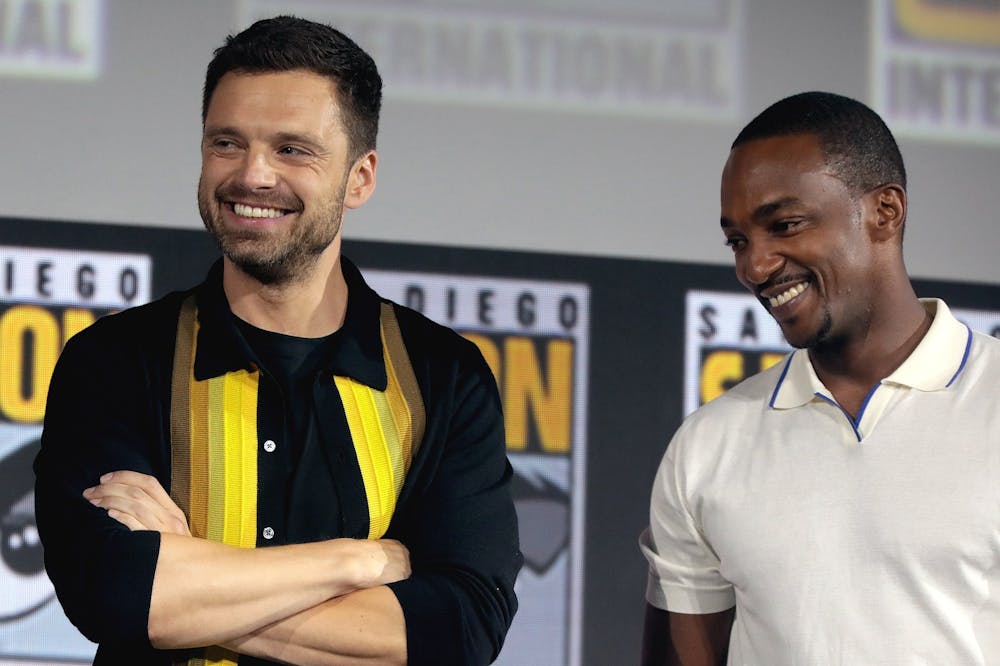Last Friday, the Marvel franchise released the first episode of the highly anticipated series “The Falcon and the Winter Soldier.” As the second installment of the partnership between Marvel and streaming platform Disney+, the show marks a distinct shift in the franchise’s scale of content. With most of the Marvel production effort backing large-scale theatrical releases, both “The Falcon and the Winter Soldier” and the recently wrapped-up “WandaVision” see the immensely popular franchise turning its attention to the previously unsuccessful realm of television. But where “WandaVision” leaned into the medium in unique and engaging ways, “The Falcon and the Winter Soldier” — thus far — falls a bit flat.
The opening episode brings us into the Marvel Cinematic Universe, colloquially known as the “MCU,” six months after the events of the studio’s last major film “Avengers: Endgame.” We immediately follow the “Falcon” Sam Wilson, played by Anthony Mackie. In a classic Marvel initial action sequence, a loosely defined bad guy has hijacked a United States Air Force jet, and the Falcon is tasked with rescuing the kidnapped pilot and taking down the enemies before the jet flies into contested airspace. Lots of punching, kicking and general mayhem ensues.
As the episode continues, the action dwindles, replaced instead with a heavy load of background context for both Wilson and Bucky Barnes, the “Winter Soldier,” played by Sebastian Stan, who we learn is on a self-redemption journey to make reparations for the violence he had wreaked throughout his life. The episode doesn’t bring our heroes together just yet — instead, it focuses on their own internal struggles and difficulties — an approach which, though likely essential to the story, comes off a bit heavy-handed.
The problem with this beginning of “The Falcon and the Winter Soldier” is not that it breaks from the Marvel tradition, but that it tries to stick to the formula too closely, to the detriment of the medium. The 47-minute episode attempts to collapse the entire emotional and action scope of a typical Marvel movie into the limited time frame, resulting in fast-paced dialogue full of overwhelming cliches and somewhat forced emotionality interspersed with long, monotonous action sequences. While these features are to be expected from Marvel Studios projects — the franchise is never one to shy away from a good fight or cheesy one-liner — in a typical Marvel film these have the opportunity to be spread out over a significantly longer runtime. Here, the emotion and the action breaks aren’t yet earned.
As exposition, the pilot serves its purpose, but is ultimately a bit scattered and inconclusive. This is not, however, to say that the series as a whole does not have the potential to grow — the plot lines established in the opening episode provide plenty of material for the series to play with, but if the writers try to pack as much into each episode as they packed into the pilot, we are in for a long and tiring ride.
Though the plot itself is a bit compressed and jumpy, the redeeming force of the episode — which will likely eventually determine the quality of the show — comes from the performances of Mackie and Stan. Both were already established reliable favorites as side characters in the Marvel Universe before the concept of the series came about, and “The Falcon and the Winter Soldier” is a long-overdue feature of both of their acting chops.
Mackie’s Sam Wilson is alternatingly careful and energetic at all the right moments, a compelling and genuinely believable hero figure who handles the range of emotionality with a great deal of skill and care. Stan’s performance is equally strong — he plays Barnes with a laissez-faire approach that is deepened and rounded out by both touching, quiet moments of sadness and a subtle but dynamic sense for comedic timing. The two are genuinely great actors when given the opportunity to be, and as a result the most compelling moments of the episode don’t come from the forced dialogue, but from the moments where the two leads are given space to breathe and shine — a phenomenon that bodes well for future episodes focusing on their relationship.
After seeing the experimental and well-paced series “WandaVision” hit the small screen, “The Falcon and the Winter Soldier” certainly feels like a return to the humdrum norm of Marvel content. It remains to be seen whether the show will take any risks in terms of television format — “WandaVision” achieved this with great success in its nod to sitcom history, but so far “The Falcon and the Winter Soldier” appears to be playing it safe by sticking to the tried and true formula. Still, for the performances alone the show is worth the watch — and who knows, perhaps there are more tricks hiding up Marvel’s sleeve.







